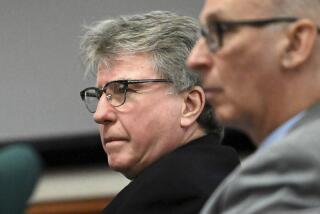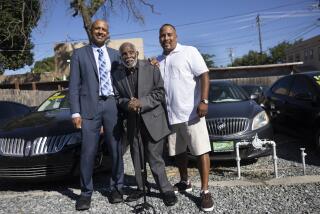Judge Gives Man’s Killer Lowest Term Possible : Courts: Todd Love, 27, is sentenced to 15 years to life and an added three years because he used gun in killing.
- Share via
Four weeks after reducing a Newbury Park man’s conviction from first-degree murder to second-degree murder, a Ventura County judge sentenced the defendant Friday to the lowest prison term possible.
Superior Court Judge Lawrence Storch sentenced 27-year-old Todd Love to 15 years to life for the murder and added another three years because Love used a gun in the killing of his sister’s boyfriend last June.
The murder sentence was mandatory, but Storch could have given Love as many as five years for using a gun. The sentencing came during a hearing in which the judge and a prosecutor engaged in a heated exchange over Storch’s handling of the case.
Deputy Dist. Atty. Michael K. Frawley accused the judge of “minimizing” the death of 32-year-old Frank Kish, who was shot to death as 911 operators listened on the phone.
“He reduced the verdict and then gave him the lowest he could have given him,” Frawley said outside court, shaking his head in disagreement.
During the sentencing hearing, Storch pointed out that before the trial, prosecutors were willing to accept a guilty plea from Love to voluntary manslaughter, which would have resulted in a maximum term of 11 years.
Storch said the earlier offer appears to demonstrate that even the prosecutor’s office did not believe that the case warranted a first-degree-murder conviction.
“I think experienced lawyers such as you know how to evaluate a case,” Storch told Frawley.
Frawley, however, told the judge that any deal that the prosecutor’s office might have offered Love before the trial was of no consequence once a jury rendered the first-degree murder verdict.
Under the law, first-degree murder must be planned, while second-degree murder does not have to be premeditated.
The jury verdict was returned last December, after Frawley told jurors that Love shot Kish after losing a fistfight to the victim. Love lived in a house with his sister, Kelli, Kish and the couple’s infant.
Carlos Spiga, Love’s attorney, agreed with the judge, saying it was “disingenuous” for prosecutors to argue for the maximum sentence after earlier offering to settle the case for a plea to voluntary manslaughter.
Spiga also questioned the district attorney’s office stated policy against plea bargaining, in light of the deal that Storch said was offered to Love.
“There is a lot of chicanery going on as far as this being a no-plea-bargaining jurisdiction,” the Los Angeles attorney said.
Spiga also asked Storch to sentence Love to the lowest sentence possible, noting that the defendant had a .20% blood-alcohol level when he shot Kish. He called Love “a redeemable human being.”
Before the shooting, Love had gotten into a fistfight with Kish. Love dialed 911 and told emergency operators that he was going to kill Kish, according to court testimony.
“Clearly, had not alcohol been involved, had not Mr. Frank Kish come and punched Mr. Love while he was on the phone (with 911), it’s very likely that Mr. Kish would be alive today,” Spiga said.
The judge, however, took the occasion to deliver a soliloquy against the existence of more than 200 million firearms in America.
“I think that this is another case that cries out in its strictest sense” for gun control, the judge said. “The only people who should be allowed to carry any guns in my view are police officers.”
He said he hoped lawmakers “will have enough guts” to outlaw firearms.
Frank Kish Sr., seated in the court audience, broke down and cried during the hearing.
The elder Kish had written a letter to the judge, calling for Storch to “send a message” by giving Love the toughest sentence possible.
“Frank leaves a 15-month-old son without a father, a mother who calls to the angels for help, a grief-stricken brother and a grandfather who still talks to him,” the letter said.
More to Read
Sign up for Essential California
The most important California stories and recommendations in your inbox every morning.
You may occasionally receive promotional content from the Los Angeles Times.













